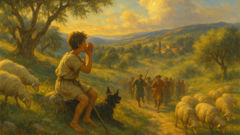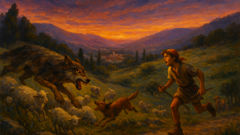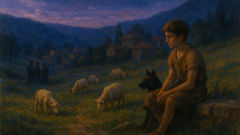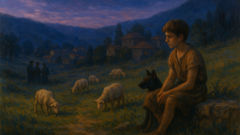Introduction
Sunrise spilled over the rolling Arcadian hills, bathing the olive groves and wild thyme in gold. The air was bright and sharp with the calls of cicadas, and the sheep grazed contentedly on the dew-kissed grass. In this ancient Greek valley, where weathered stones remembered gods and heroes, life was measured not by grand events but by the slow turning of the seasons and the daily rituals of its people. Among them was a boy named Daphnis, whose laughter echoed across the pastures as he watched over his flock each day. The village of Heliodora nestled at the foot of the hills, its whitewashed homes and red-tiled roofs clustered around a well that had never run dry. Here, news traveled by word of mouth, and a man’s reputation was his most precious treasure. The villagers trusted one another as neighbors, friends, and kin. Yet, as with any tightly knit community, they also watched, listened, and remembered. Daphnis, clever and restless, found the slow pace of shepherding stifling. While the sheep moved in docile clusters, his thoughts darted like swallows. He knew every rock and hidden path, every twist of the stream and bend of the wind. He also knew that, while his flock grazed, his mind could wander. But on this particular spring, his mischief would set in motion a lesson that would echo long after the sheep returned home and the sun slipped behind the mountains. This is the story of how a single boy’s careless game tested the trust of a whole village—and of what was lost, and what was learned, when truth itself became the rarest thing on those golden hills.
A Shepherd’s Boredom and a Dangerous Game
Daphnis loved the freedom of the hills, but not the monotony. Day after day he led his sheep to pasture, and day after day, nothing changed. The wind whispered through the olive trees, cicadas droned, and the sheep grazed in silence, their lives a tapestry of green grass, white wool, and sleepy afternoons. Daphnis would watch clouds drift above Mount Menalos and imagine the adventures of Odysseus or Heracles, but nothing ever happened—not to him.

Beneath a twisted old fig tree, Daphnis would sometimes carve shapes into soft wood or whistle tunes that startled sparrows from their hiding places. His only companions were his loyal dog, Skilos, and the sheep, each with their own quirks but none able to answer his jokes. The villagers passed by on the far road now and then, waving and calling out, but rarely stopped long. Their days were as full as his were empty. The boy’s parents, like all in Heliodora, expected him to take his duty seriously. The hills were home to wolves—cunning, silent, patient. That was the old warning, repeated so often it sounded more like a prayer than a threat. Yet Daphnis, in his youth, had never seen a wolf, not even a distant shadow.
One afternoon, bored beyond measure, Daphnis looked down at the village and felt a flicker of inspiration. What if, for once, something truly exciting happened? He cupped his hands and shouted at the top of his lungs, “Wolf! Wolf! The wolf is chasing my sheep!”
The cry echoed off the rocks and down to the cluster of homes. Within minutes, men and women dropped their tools and hurried up the hillside, voices raised in alarm. Armed with sticks and stones, they found Daphnis doubled over with laughter beneath his fig tree, the sheep munching grass undisturbed. Some villagers scolded, others simply shook their heads and trudged back. Daphnis felt a burst of pride—he had made the afternoon exciting after all.
He tried it again two days later. “Wolf! Wolf!” he cried, this time adding a convincing note of terror. Again the villagers rushed to his aid, breathless and ready to defend the flock. Again they found only Daphnis’s mischief and sheep untroubled. This time, their scolding was sharper. Old Leandros, who had a limp from a youthful accident, wagged a finger in Daphnis’s face. “A shepherd’s word is his bond, boy. You make light of it and soon no one will listen—not even when it matters.”
But Daphnis, flushed with success, didn’t listen. He boasted to Skilos that he could summon half the village with a shout. It became a game to him—a way to turn boredom into fun, to test the patience of those who, in his eyes, led far duller lives than the heroes of old. In the evenings, around the fire, he told his parents only of the sheep’s antics or a rare bird’s flight. He left out the stories of laughter echoing across the hills at the villagers’ expense.
And so the days rolled on, with Daphnis calling out, “Wolf!” whenever the mood struck him. The villagers grew weary and angry, grumbling that a boy who lied was worse than a wolf itself. But Daphnis paid them little mind, believing that he could always win their trust back with a smile or a clever word.
He didn’t see the shape that sometimes watched from the shadows at dusk. He didn’t notice how Skilos grew restless, nose to the wind. Nor did he sense the subtle change in the flock, how they bunched together or looked nervously toward the edge of the wood. In his mind, he was still safe atop the hill, master of his flock and the laughter of his village.
Truth on the Wind: The Wolf Comes
Spring deepened into summer, and the hills grew lush. But the sense of unease among the flock lingered. Skilos prowled with hackles raised, eyes darting at shadows. Even Daphnis found himself glancing toward the treeline at times, though he quickly shrugged off the feeling. The boy’s pranks became less frequent as the villagers stopped responding. When he shouted “Wolf!” now, his voice echoed in empty air. At most, an old woman would lean from her doorway and shake her head before returning to her weaving.

One evening, just as the sky blushed violet and gold, Skilos began to bark—low, urgent, unlike any call Daphnis had heard before. The sheep clustered tightly, stamping in agitation. From the edge of the wood, a shape emerged: large, gray, eyes glowing like embers in the half-light. It was the wolf, sleek and silent, exactly as the elders had always described.
Daphnis’s heart pounded. He leapt to his feet and screamed, “Wolf! Wolf! It’s real this time! The wolf is among the sheep!” But his words vanished into the wind. No one came. The village roofs glowed warm with lantern light, but the paths were empty. Panic rising, Daphnis shouted until his throat burned. He grabbed stones and hurled them at the beast, Skilos lunging and snarling beside him. The wolf darted through the flock, jaws flashing, scattering terrified sheep in all directions. Daphnis chased, screaming for help that didn’t arrive. He slipped on loose stones and fell hard, scraping his knees as he scrambled up again. The wolf vanished into the darkness with two lambs dangling from its jaws.
When at last Daphnis stumbled down to Heliodora, clutching Skilos and weeping, he found doors closed and windows dark. Only in the square did he meet the elders. They listened to his stammered tale in silence, faces grave. Leandros finally spoke. “A liar’s voice is lost even when it carries the truth.”
The next morning, the villagers climbed to the pasture and saw the signs: blood on the grass, sheep scattered and trembling, Daphnis exhausted and silent. Not a word was spoken as they gathered the flock. Daphnis followed at the rear, his eyes on the ground, a sharp ache twisting in his chest.
A Village Reckons with Truth
In the days that followed, Daphnis felt the weight of his actions settle over him like a shroud. He barely spoke, tending his flock with a new vigilance, Skilos never straying far from his side. The villagers, though polite, kept their distance. Their glances—once full of warmth—were now cool, cautious, edged with something like pity. Daphnis had lost more than two lambs; he had lost their trust.

Heliodora was a place where stories spread quickly. Children whispered about the wolf and the boy who lied. Some adults wondered aloud whether Daphnis should be given another chance, while others shook their heads. “A broken cup can be mended,” muttered old Leandros at the well, “but it will always show its cracks.”
One evening, Daphnis’s father summoned him to the fire. The family ate in silence until at last his father spoke. “A word spoken lightly can cast a long shadow,” he said. “You have learned this now. But what will you do?”
Daphnis looked at the flames and, for the first time, saw his own actions reflected there—bright, careless, impossible to take back. He resolved to change.
He began by rising early each morning, watching over his sheep with renewed care. He mended broken fences, gathered strays, and apologized to each villager he had wronged. Some nodded curtly; others turned away. But slowly, a few softened. When another sheep went missing one night, Daphnis did not cry for help; he tracked its prints himself and found it tangled in brambles. He returned it to its owner without boasting. Word spread of his efforts.
As summer faded, the villagers began to trust him—cautiously—again. Children who had once jeered now asked for stories about the hills. Even Leandros, though still stern, began to greet him by name. But Daphnis never forgot that first night when his voice had meant nothing, and the wolf’s shadow loomed larger than any lie.
In time, Daphnis became known not as the boy who lied, but as the shepherd who learned wisdom the hardest way. He carried the lesson with him all his days: that trust, once broken, is harder to mend than any fence or bone.
Conclusion
Trust is woven from countless small moments: a word kept, a promise honored, a hand extended when it matters most. In Heliodora, as in any village, it was the foundation on which all else rested. Daphnis never forgot what it felt like to call out and hear nothing in return. The memory followed him into adulthood, shaping every story he told and every promise he made. The villagers too remembered—the way a single careless voice could fray the strongest bonds. Over the years, Daphnis became not just a shepherd but a man whose word was valued and whose honesty stood as an example for all. And on warm evenings, when children begged for stories beneath the fig tree, he would smile and remind them: A lie may seem harmless at first, but it can cost you what matters most. In this way, the lesson lived on—echoing across the Arcadian hills with each new dawn.













